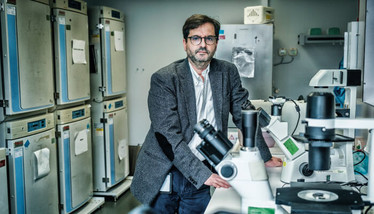The Pharmaceutical Nomad
Sitting Down With... Miguel Forte, Chief Executive Officer at Bone Therapeutics, Belgium

Did you always want to work in the pharma industry?
I always wanted to be involved with scientific challenges. I remember as a child being interested in biology – things like mammoths trapped in ice! – then later, biomedical science and eventually medicine. I saw medicine as a technical science that was also dynamic and relevant. Seeking this combination of science and dynamism is something that has shaped my career, as well as the desire to teach and to communicate.
How did you get into industry?
I did my PhD at the University of Birmingham, UK, on HIV, which was emerging at that time – in fact, we published a paper involving the first HIV patient in Portugal. From there, I was able to work on some of the first treatments for HIV. Getting these antivirals to work for HIV patients had a significant impact on me personally – I saw what innovation in drug development can do for real people.
I then left academia to work as a regulator for the EMA, which gave me the opportunity to look at some of these products from the other side – in terms of the risks and benefits. To develop a pharmaceutical product, there will always be an element of risk, but you have to take calculated risks to create value.
My experience of working on an innovative medicine, both in terms of immunology and patient benefit, made me think that going onto to develop products would be interesting.
How did you find the transition from academia?
Energizing! When I was appointed professor of a university in Portugal, I went to the leadership and proposed several changes. They told me my time would come to make changes, but that it was too soon! I understood that taking the time to think, to brainstorm, to explore various potential avenues is important in a university – it’s how new ideas are generated in early-stage research. But translating an idea into a product requires focused decision making – you have to dispense with what isn’t necessary. I found industry to be a more natural fit and the transition was quite invigorating.
What are the most important lessons you’ve learned as a CEO?
Finding the right people is a huge part of success as a leader. I built a team from scratch when I was CEO at Zelluna; I was tasked with reorganizing the team as CEO of TxCell; and now I’m doing the same for Bone Therapeutics. You need to find talented people, put them in the right place, and then move together towards a shared vision. But you also have to know when it is time to end a project if it isn’t going to work. Ending something can be painful, emotionally, as you may need to deconstruct and reorganize your team, but sometimes it is absolutely necessary for long-term success.
What excites you about your new role at Bone Therapeutics?
I was previously chief medical officer for Bone, but moved on to lead and build another organization. I’m pleased to be able to return as CEO. Bone Therapeutics is a regenerative medicine company focused on orthopedics and bone diseases. And our core technology is an off-the-shelf allogeneic cell therapy platform, which turns undifferentiated stem cells from healthy donors into bone-forming cells. We have two assets going into middle and late-stage clinical development, with a market opportunity in sight. I’m excited by the prospect of being able to treat patients, not only in the clinic, but with an approved product. Plus, Bone is a big organization and this represents a significant challenge to set the vision, deliver on the clinical data, and also continue to foster innovation moving forward.
You’re well known for commuting far and wide for work…
You could say that! I moved from Portugal to Belgium when I was at BristolMyersSquib and the family settled there. We agreed that I could take a job somewhere else but they would stay. I’ve commuted to Dublin, the South of France, Norway… But it’s not as though I’m sat in an office in another country week after week. The life of a pharma CEO is nomadic – flying to New York one week to talk to investors, Singapore the next for a conference, back to Europe to meet a client... It’s just part of the job of a pharma CEO.
Recently, I was in San Francisco going from meeting to meeting on one of those electric scooters because we just couldn’t get taxis. I had a real sense of purpose about what I was doing and when I got back to the office I felt energized speaking with the team about the possibilities. Although the trip was physically draining the sense of purpose and drive keeps me going.
Would you ever settle down?
My wife has given up asking me that question! I couldn’t imagine working at a slower pace. But I’m sure there will be a time when I’ll have to settle. I do love to teach, and help shape careers and watch people grow, so I could see myself shift emphasis towards that.
What about the cell and gene therapy industry as a whole… Is it living up to the hype?
I think new technologies tend to be overestimated in the short term and underestimated in the long term. We’ve had some big successes and that set up the expectation of being “the next big thing.” The field is maturing now and showing resilience, but there are challenges to face.
What excites me most today is the opportunity to use cells as tools that can be engineered in multiple ways. Immunotherapy is offering significant value in terms of treating unmet needs, but we're also seeing the rise of regenerative approaches that will address morbidity, rather than mortality. And that’s how the field will mature – by finding new solutions for different unmet medical needs.
You’re running for president of ISCT… What is your main aim for the Society?
The mission of the International Society for Cell and Gene Therapy (ISCT) is to foster the development of new cell and gene therapy products for patients. I want to build the organization's reputation as the home for individuals developing cell and gene therapy products, who can use the society to exchange views, learn and teach.
How does this work in practice? Take the commercialization committee, for example: here we bring together experts to focus on the problems and opportunities faced by those developing products. The committee is subdivided into product and process development, business model and investment, and clinical development and patient access sub-committees – this reflects the topics that continue to be most relevant to those directly involved in developing cell and gene therapies. We have input from suppliers of services and products, drug developers, payers, investors, academics, start-ups and of course patients, physicians and nurses. My main aim is to expand the membership so that we have a larger pool of stakeholders and experts – across various disciplines – to facilitate the sharing of knowledge and solutions.

Over the course of my Biomedical Sciences degree it dawned on me that my goal of becoming a scientist didn’t quite mesh with my lack of affinity for lab work. Thinking on my decision to pursue biology rather than English at age 15 – despite an aptitude for the latter – I realized that science writing was a way to combine what I loved with what I was good at.
From there I set out to gather as much freelancing experience as I could, spending 2 years developing scientific content for International Innovation, before completing an MSc in Science Communication. After gaining invaluable experience in supporting the communications efforts of CERN and IN-PART, I joined Texere – where I am focused on producing consistently engaging, cutting-edge and innovative content for our specialist audiences around the world.



















